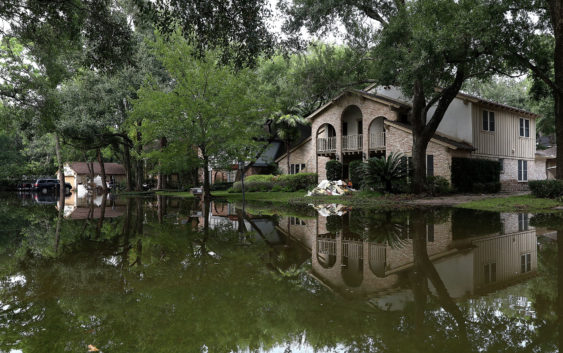- The Pick of the Week today; severe weather chances by the end of the weekend
- Chimney Rock business rebuilds with state support after hurricane
- One year after devastating Panhandle wildfires, Canadian resident reflects on the work of rebuilding
- Hays County judge says software glitch caused some communication issues during wildfires
- FEMA deadline for Hurricane Helene recovery aid to governments, nonprofits extended
Up to 50% of residential flooding during Hurricane Harvey caused by climate change, study says

Hurricane Harvey wrought enormous destruction across the Gulf Coast when it made landfall five years ago, and no place was hit worse than Houston, where the storm dropped an estimated one trillion gallons of water and caused more than 35 flood-related deaths.
Harvey marked the largest rain event in U.S. history, and it obviously would have caused a great deal of damage to the city no matter what. However, new research published last week in Nature Communications asserts that without the effects of climate change, damage done by the infamous hurricane could have been much less severe.
For example, flooding in as many as 30-50 percent of residential parcels was likely caused by climate change, per the study, meaning that as many as 50,000 homes could have avoided serious floods. “Just a few extra centimeters of rainfall from climate change could be the difference between getting a very soaked lawn or thousands of dollars of property damage,” said Kevin T. Smiley, an assistant professor of sociology at Louisiana State University and lead researcher on the project, in a New York Times interview.
This type of investigation, known as “climate change attribution,” is a growing field that uses models to run two different scenarios comparing what did happen versus what would’ve happened in a world unaffected by climate change. This method has recently been used to demonstrate how climate change has made heat waves in Pakistan and India 30 times more likely and that climate changes increased rainfall rates and amounts during the active 2020 hurricane season.
The purpose of the Harvey study, in addition to quantifying the effects of climate change and its relationship to natural disasters, was to understand how Hurricane Harvey disproportionately impacted specific populations. Through the study, researchers discovered that the effects attributed to climate-change had an outsized impact on Latino communities, particularly those residing in low-income areas outside the 100-year-flood zone. Many of these areas were developed along the waterways that are home to Houston’s petrochemical facilities.
In addition to its own modeling, the inquiry led by Smiley used previously published research that demonstrated how rainfall was up to 38 percent higher during Harvey due to climate change than it would have been otherwise.
The fact that these groups were outside of the 100-year-flood zone, the study points out, means residents of these areas “were also less likely to be forewarned of the flood risk to which they may be exposed,” and thus were less likely to make an effort to mitigate flood damage through the purchase of flood insurance or other measures. “Our focus is thus on climate justice challenges that not only concern future climate change-induced risks,” the study authors wrote, “but are already affecting vulnerable populations disproportionately now.”
That kind of impact could exacerbate social inequality around Houston.“The main way people often build wealth in the middle class is through their home. When your home floods, it’s very hard to recover from that flooding,” Smiley told Gizmodo. “The cascading implications go well beyond just that floodwaters in your home.”